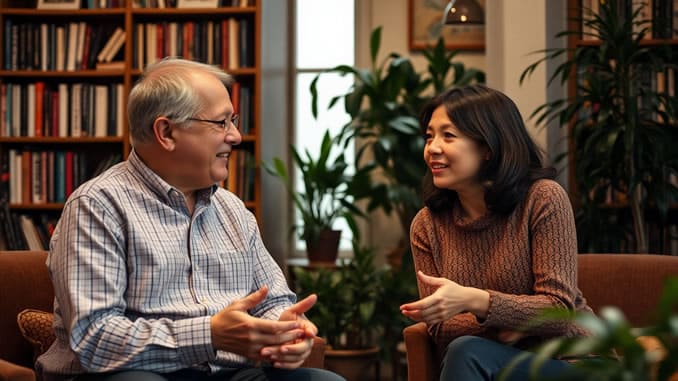
Life Experience and Mindful Perspectives: A Personal Journey
In my life, I have learned that mindfulness is not just a practice, but a way of living that can bring about profound changes. This article reflects my personal experiences and insights on the path to a more mindful life.
The Beginning of My Mindfulness Journey
My journey to mindfulness began during a time of personal crisis. Overwhelmed by stress and anxiety, I was searching for a way to find inner peace. The first steps were not easy. Meditation initially felt strange and uncomfortable. But over time, I began to notice subtle changes in my perception and how I dealt with challenges.
Transformation of Relationships
One of the most remarkable changes I experienced was in how my relationships with other people developed. Through the practice of mindfulness, I learned to truly listen without immediately judging or reacting. This led to deeper and more authentic connections.
In conversations, I noticed how I became more present. Instead of constantly thinking about my next response, I could fully engage with the words and feelings of the person I was talking to. This new quality of attention was often noticed and appreciated, leading to more open and honest conversations.
Conflicts that previously ended in arguments and frustration could now often be approached with more understanding and compassion. I learned to observe my own emotional reactions before acting, which helped me give more thoughtful and compassionate responses.
The Challenge of Authenticity

Despite my growing mindfulness practice, I found that I sometimes still fell into old patterns of insincerity. This led to an important realization: mindfulness doesn't automatically make us perfect people. Rather, it gives us the tools to see our actions and motivations more clearly.
Why Mindful People Can Still Lie
It's a common misconception that mindful people are always completely honest. The reality is more complex:
- Habitual patterns: Behaviors practiced for years can't be changed overnight. Even with growing mindfulness, old patterns of insincerity can sometimes be automatically activated.
- Conflict avoidance: Sometimes the desire to maintain harmony or not hurt others can lead to small untruths. This shows that mindfulness alone is not enough – we must also develop the courage to be authentic, even when it's uncomfortable.
- Self-protection: In situations where we feel threatened or vulnerable, even mindful people can resort to protective mechanisms like lying.
- Imperfect self-awareness: Mindfulness is a process, not perfection. We can't always be fully aware of our motives.
This realization was initially disappointing for me, but it led to a deeper understanding and greater self-acceptance. I learned that mindfulness doesn't mean being perfect, but becoming aware of our imperfections and continuously working on ourselves.
Integrating Mindfulness into Everyday Life
Over time, I discovered ways to integrate mindfulness into my daily life, beyond formal meditation sessions:
- Mindful eating: I began to be more conscious of my meals, tasting the flavors and being grateful for the food.
- Mindful walking: Even on the way to work, I tried to be aware of my steps and the surroundings.
- Mindfulness in conversations: I practiced being truly present when talking to others, instead of mentally drifting off.
These small changes had a cumulative effect that changed my entire sense of life.
Challenges and Setbacks
My path to mindfulness wasn't always straightforward. There were times when I neglected my practice and fell back into old patterns. Stressful phases at work or personal crises tested my ability to remain mindful.
But I learned to accept these setbacks as part of the journey. Each time I returned to mindfulness, it felt like a new beginning – a chance to look at myself and my practice with fresh eyes.
The Transformative Power of Mindfulness
Looking back, I can say that mindfulness has profoundly changed my life. It has helped me:
- Deal with stress and challenges more calmly
- Develop deeper and more authentic relationships
- Experience more joy and gratitude in everyday life
- Understand and accept myself better
- Be more compassionate with myself and others
But perhaps most importantly is the realization that mindfulness is not a goal to be achieved, but an ongoing journey. It's not about being perfect, but about returning to the present moment again and again, with openness, curiosity, and compassion.
Conclusion: A Path, Not a Destination
My experience with mindfulness has taught me that it is a lifelong journey. It's an invitation to consciously experience every moment, to observe our thoughts and feelings without being controlled by them, and to look at ourselves and others with compassion.
Mindfulness doesn't make us perfect, but it gives us the tools to live more consciously, compassionately, and authentically. It reminds us that each moment is a new opportunity to be present and consciously shape our lives.
I invite everyone to embark on this journey. The challenges are real, but the rewards – a deeper understanding of ourselves, richer relationships, and a more fulfilled life – are worth it.
08.10.2024
Heike Schonert
HP für Psychotherapie und Dipl.-Ök.
Heike Schonert
Heike Schonert, alternative practitioner for psychotherapy, qualified economist. As an author, journalist and designer of this magazine, she puts her whole heart and knowledge into this task.
The magazine's great success is a tireless drive to help provide this earth and all its living beings with a livable and lovable environment that serves the community and connection of all living beings.
Her motto is: “If we are honest with ourselves, understand ourselves as a whole and are filled with the desire to heal ourselves and love ourselves as we are, we will pass this love on to other people and grow with them. “





